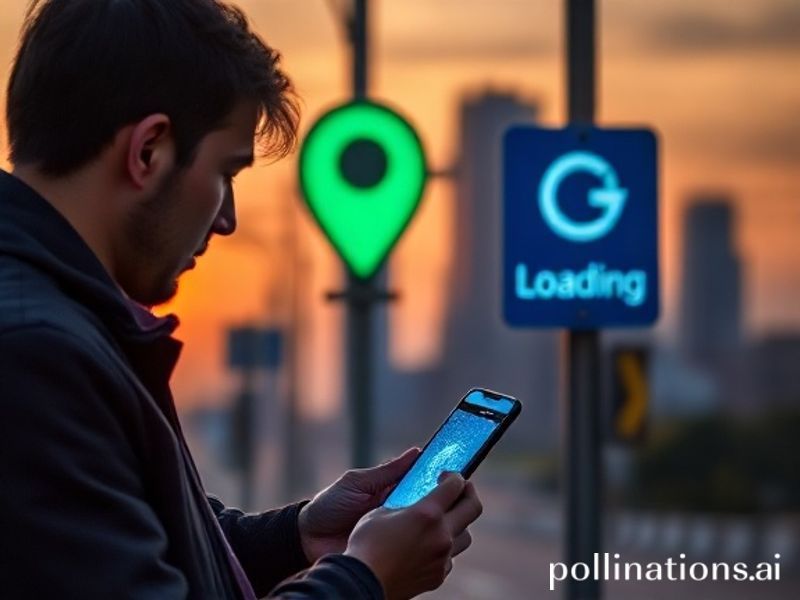Worldwide Panic as Google Maps Drops Off the Face of the Earth (Spoiler: It Came Back)
Google Maps Goes Dark: A Global Existential Crisis in 404 Kilometers
By Dave’s Locker Foreign Correspondent, somewhere between lost and not-amused
Lagos, 07:14 a.m. WAT – A city of 21 million people collectively discovers that the blue dot has vanished. On the mainland, danfo drivers argue over whose cousin studied geography in 1997. Island bankers in air-conditioned SUVs sit frozen at traffic lights, suddenly unsure whether the office is “left after the third roundabout” or “somewhere near that one chicken place.” They check Twitter, where #MapsDown is already trending in twelve languages, two emojis, and one GIF of a cat wearing a paper map as a hat.
Across the Atlantic, São Paulo’s 39,000 app-delivery riders—previously guided by the omniscient voice of Google—revert to the ancient art of asking strangers for directions. Brazilians being Brazilians, the strangers respond with elaborate, contradictory stories that somehow all involve a cousin who once dated a girl who lived “near there.” Average delivery times triple; cold acai bowls become a first-world tragedy.
In Delhi, the outage collides with early-morning rush hour. Autorickshaw drivers, whose internal compass normally has the precision of a roulette wheel, now hold their phones skyward like astrolabes, praying for satellites that refuse to talk back. A startup founder live-streams his meltdown on LinkedIn, insisting this is “worse than demonetization.” Within minutes, his post is cross-posted to Reddit, where someone replies, “Relax, bro, just use Apple Maps,” and is promptly down-voted into digital oblivion.
Europe responds with bureaucratic efficiency. The EU’s crisis-response WhatsApp group convenes an emergency emoji poll: 🇪🇺🗺️❓. Finland offers to open-source its national mapping data; France threatens to nationalize Waze; Germany quietly prints 50 million paper atlases, the ink still wet with nostalgia and solvent. Somewhere in Brussels, an unnamed official drafts Regulation 404/2024 on “Digital Cartographic Resilience.” It is 847 pages long and will be ignored by everyone except law students desperate for thesis topics.
Meanwhile, the United States splits along predictable lines. Red-state militias interpret the outage as a Deep State psy-op and begin navigating by “celestial reckoning,” which mostly means driving into cornfields. Blue-state wellness influencers pivot to “mindful disorientation,” charging $399 for weekend workshops on “finding your inner compass.” Ticket sales are robust.
At 08:52 UTC, Google issues a two-line statement: “We are aware of an issue affecting Google Maps and are working to resolve it.” The sentence is translated into 43 languages, each version slightly more passive-aggressive than the last. The Japanese version adds a bowing emoticon; the German version includes a 47-character compound noun that roughly translates to “pre-planned contingency-restoration-protocol.”
In global financial markets, shares of paper-map manufacturers spike 400%. Rand McNally briefly surpasses Tesla in market cap before traders realize the company still prints “Yugoslavia” on Page 42. Oil prices dip on fears that ride-hail drivers will simply give up and go home; they rebound once everyone remembers humans are fundamentally too lazy to walk.
By noon GMT, the service sputters back to life. The blue dot reappears, slightly smugger than before. Push notifications ping from New York to Nairobi: “Welcome back! Rerouting…” The planet exhales. Lagos drivers re-calibrate without apology; São Paulo couriers resume cutting across four lanes with millennial impunity; Delhi commuters scroll through memes comparing Google’s outage to the Mahabharata.
And yet, something lingers. A quiet, unsettling awareness that we have off-loaded our sense of direction—along with privacy, common sense, and the mental muscle to remember a single landmark—to a corporation whose unofficial motto is “Move fast and break continents.” Somewhere a paper atlas gathers dust, its spine uncracked since 2009, whispering the loneliest of reassurances: “You still know how to fold me.”
But nobody listens. The blue dot glows, the engines restart, and humanity accelerates toward the next outage—comfortably, confidently, catastrophically lost.







